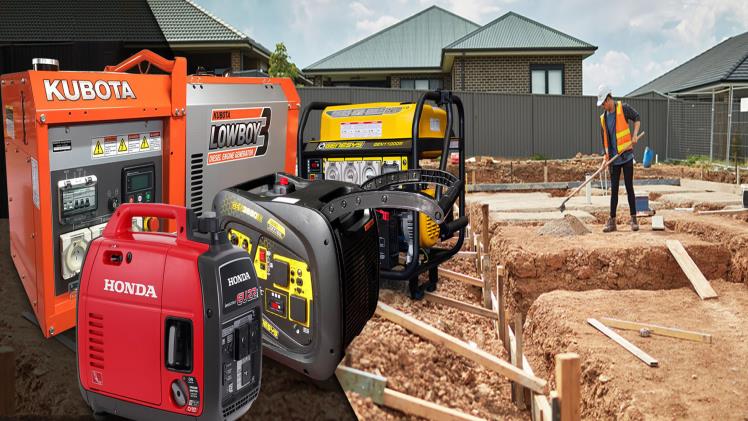Choosing the right portable generator can significantly enhance your comfort and safety during power outages or outdoor activities. With the increasing reliance on electricity for daily activities, having a reliable generator is more crucial than ever. Portable generators come in various sizes and capacities, making it essential to consider your specific needs before purchasing. We will explore the key factors to consider when selecting portable generators of Houston, including power needs, fuel type, portability, and additional features, to help you make an informed decision tailored to your requirements.
Understanding Your Power Needs
Before diving into the specifics of portable generators, Penny Realty Management notes that it’s vital to understand your power requirements. Every appliance and tool has a power rating, usually indicated in watts. List the devices you plan to power simultaneously to determine the total wattage you’ll need. Common household items like refrigerators, heaters, and lights each have their wattage requirements. Calculating the starting (surge) and running wattage is essential. Starting wattage refers to the additional power needed to start appliances like refrigerators or air conditioners while running wattage, which they consume during operation. A portable generator should be capable of handling the total wattage load, including any potential surges. As a rule of thumb, add about 20-30% more wattage to ensure you have a buffer for unexpected power demands. Understanding your power needs is the foundation for selecting an appropriate generator.
Fuel Types and Efficiency
Once you’ve assessed your power needs, the next consideration is the type of fuel your portable generator will use. The most common fuel types include gasoline, propane, and diesel. Gasoline generators are often favored for their widespread availability and initial lower cost. However, they can be less efficient and have a shorter shelf life than other fuel types. On the other hand, propane generators tend to run cleaner and have a longer shelf life, making them suitable for extended use. Diesel generators are typically more fuel-efficient and have a longer operational life but are usually more expensive upfront. Additionally, consider the generator’s run time on a single fuel tank, as longer run times mean less frequent refueling during extended power outages. By understanding the fuel types available and their efficiency, you can select a generator that aligns with your needs and preferences.
Portability and Storage Considerations
Another critical factor to evaluate is a generator’s portability. A lightweight and compact model will be more convenient if you plan to use the generator for outdoor activities like camping or tailgating. Look for features like built-in wheels and handles, which can make transporting the generator easier. However, portability shouldn’t compromise performance. Ensure the generator still meets your power needs while being easy to transport.
Additionally, consider where you will store the generator when not in use. Some models can be bulky and require adequate space. A designated storage area that protects the generator from the elements can extend its lifespan. Therefore, consider the balance between portability and power when selecting a generator that fits your lifestyle.
Noise Levels and Environmental Impact
Another important consideration when choosing a portable generator is noise level. Many generators operate at varying decibel levels, which can significantly impact your comfort and that of your neighbors. Generators that produce less noise are often labeled as “quiet” or “inverter generators,” designed to operate at lower noise levels while maintaining efficiency. Investing in a quieter model may be wise if you intend to use the generator in residential areas or during camping trips. Moreover, consider the environmental impact of the generator you choose. Some models produce more emissions than others, particularly those powered by gasoline. You can select a generator that meets your power needs by evaluating noise levels and environmental impact without disturbing your surroundings.
Additional Features and Safety Considerations
Modern portable generators often come with various features that enhance usability and safety. Look for models with multiple outlets, allowing you to connect various devices simultaneously. Features such as automatic shut-off mechanisms, overload protection, and low-oil shutdown enhance safety by preventing potential hazards. Some advanced generators even have built-in displays that provide real-time information about power output, fuel levels, and maintenance needs, making them easier to monitor and manage. It’s also advisable to consider the generator’s starting method—manual recoil versus electric start—as an electric start can provide added convenience. Moreover, ensure that the generator has adequate ventilation to prevent carbon monoxide buildup, a critical safety concern when using portable generators indoors or in enclosed spaces. By considering these additional features and safety measures, you can select a generator that meets your power requirements and prioritizes your safety.
Choosing the right portable generator involves carefully considering various factors, including power needs, fuel types, portability, noise levels, additional features, and budget. By assessing your requirements and understanding the options available, you can select a generator that provides reliable power when you need it most. Remember that investing in a quality portable generator is about immediate needs and ensuring comfort, safety, and peace of mind for years to come.


